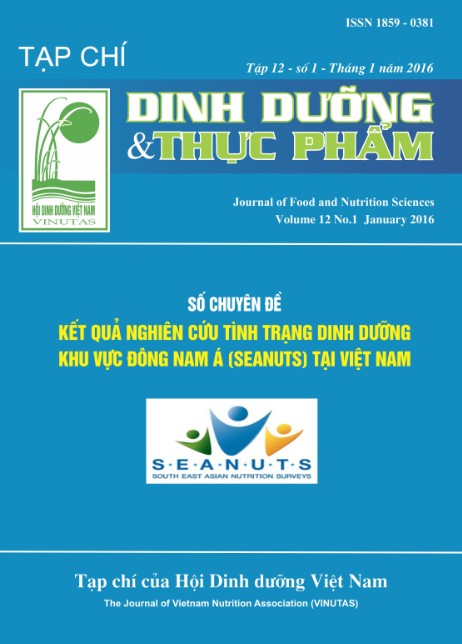IMPACT OF BREAKFAST SKIPPING ON NUTRITIONAL STATUS OF PREAND PRIMARY-SCHOOL AGED CHILDREN (2-11 YEARS OLD)
Main Article Content
Abstract
Although the importance of adequate breakfast for health and school performance of
children is well known, there is little information about this meal of Vietnamese children,
especially of preschool and primary school-aged ones (2-11 years old). The study aimed
to find the composition of breakfast in this age group, its impact on daily nutrient intake,
as well as on nutritional anthropometric status. Method: A cross-sectional study in 2583
children in the ages of pre- and primary-school (2-11 years old) was conducted. Variables
included the prevalence of breakfast skipping, comparison of percentage of RDA meeting
level of some nutrients between daily and non-daily breakfast groups and association between breakfast consumption and nutritional anthropometric status. The results were corrected for gender, age, living area and region. Results: 10.5% of children skipped breakfast.
This percentage varied by age, area, region, mother's education and household economic
conditions. The RDA meeting level was more adequate in the daily breakfast group than
in the non-daily one. The stunting prevalence of primary school aged children was 2.5
times lower in the daily breakfast group than that in the non-daily breakfast one. Conclusion: Breakfast skipping considerably reduced the adequacy of daily nutrient intake of the
children and significantly increased the risk of being stunted in primary school aged children.
Keywords
Breakfast, children's nutrition, children's health
Article Details
References
2 Đại Học Y Hà Nội (2012 ). Dinh dưỡng hợp lý cho người lao động. Dinh dưỡng và vệ sinh an toàn thực phẩm. Nhà xuất bản y học.
3 Freitas P.P.D.; Mendonça R.D.D.; Lopes A.C.S. (2013). Factors associated with breakfasting in users of a public health service. Rev. Nutr. vol. 26 no.2 Campinas Mar./Apr .
4 Ghazi H.F. and Aljunid S. (2013). Eating for Intelligence: Breakfast and IQ among Iraqi Children. NUN, Articles, Food &Nutrition
5 Horikawa C, Kodama S, Yachi Y, Heianza Y, Hirasawa R, Ibe Y, Saito K, Shimano H, Yamada N, Sone H. (2011) Skipping breakfast and prevalence of overweight and obesity in Asian and Pacific regions: a meta-analysis. Prev Med 53(4-5):260-7.
6 Kapantais E, Chala E, Kaklamanou D, Lanaras L, Kaklamanou M and Tzotzas T. (2011 ) Breakfast skipping and its relation to BMI and health-compromising behaviours among Greek adolescents. Public Health Nutr 14(1):101-8.
7 Khanh L.N.B., Mine B., Tuyen L.D., Chinh N.H., Truong N.H., Paul D., Ilse T.K. (2015). The role of dairy in helping Vietnamese children to meet their daily nutrient requirements: the South East Asian Nutrition Survey. ACN 2015 abstract book, 305
8 Philippi S.T. (2008). Pirâmide dos alimentos: fundamentos básicos da nutrição. Barueri: Manole.
9 Pollitt E. (1995). Does Breakfast Make a Difference in School? J Am Diet Assoc.; 95: 1134-1139.
10 Tổng Cục Thống kê (2010). Báo cáo kết quả tổng điều tra dân số và nhà ở năm 2009. NXB Thống kê.


